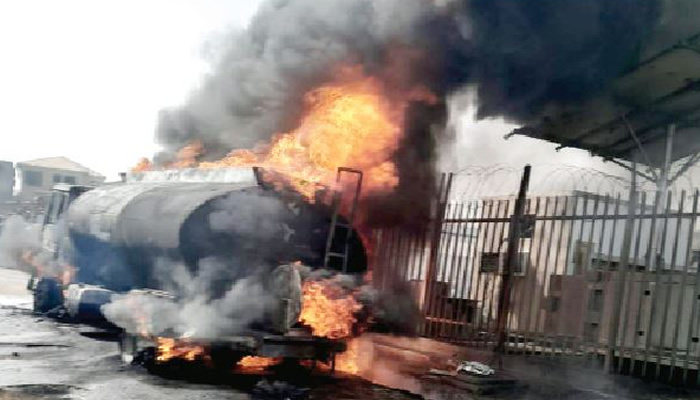The quiet Saturday morning in Dikko, Niger State, was shattered by a devastating tanker explosion, claiming the lives of at least 70 individuals, including a pregnant woman and numerous children. The tragedy unfolded after a speeding petrol tanker crashed at Dikko Junction, spilling its flammable cargo. Drawn by the prospect of free fuel, scores of residents, oblivious to the imminent danger, rushed to the scene to scoop up the leaking petrol. The ensuing explosion transformed the scene into an inferno, engulfing those scrambling for fuel and bystanders alike. Eyewitnesses recounted the horrific scene, describing people engulfed in flames and a desperate scramble for safety amidst the chaos. The absence of immediate emergency response exacerbated the situation, leaving community members and vigilantes to grapple with the immediate aftermath.
Conflicting reports emerged regarding the exact death toll, with eyewitness accounts suggesting upwards of 80 fatalities, while official figures from the National Emergency Management Agency (NEMA) placed the number at 70. The Niger State Commander of the Federal Road Safety Corps (FRSC) confirmed the incident, attributing the explosion to the spilled fuel igniting. He reported that numerous individuals sustained severe burns and were transported to nearby hospitals for treatment. The Director-General of the Niger State Emergency Management Agency (NSEMA) provided a similar account, highlighting the collaborative efforts of various agencies and volunteers in the search and recovery operation. NEMA’s report further detailed that many of the victims were burned beyond recognition and emphasized the community members and passers-by who were caught in the blast.
The Director-General of NEMA, Mrs. Zubaida Umar, expressed deep regret over the incident, condemning the reckless behavior that led to the tragedy. Despite extensive public awareness campaigns on the dangers of approaching crashed tankers, she lamented that many continue to disregard these warnings, resulting in recurring loss of life. The incident serves as a stark reminder of the critical need for adherence to safety protocols during such emergencies. Meanwhile, the Controller-General of the Federal Fire Service called upon fuel station owners and tanker operators to address the issue of reckless driving, urging a review and enforcement of stringent safety regulations for fuel transportation nationwide. He stressed that the increasing frequency of tanker explosions points to preventable lapses that must be addressed urgently.
Niger State Governor, Mohammed Bago, expressed shock and grief over the tragedy, extending his condolences to the families of the victims and directing relevant agencies to provide necessary assistance. He urged residents to prioritize their safety and underscored the importance of collective efforts in preventing such incidents. The Minister of Petroleum Resources, Senator Heineken Lokpobiri, echoed these sentiments, describing the loss of life as heartbreaking. He emphasized the need for heightened safety measures and implored the public to avoid approaching crashed fuel tankers, highlighting the inherent dangers. The minister ordered the Nigerian Midstream and Downstream Petroleum Regulatory Authority to conduct a thorough investigation into the incident.
This devastating explosion in Niger State is not an isolated incident but rather the latest in a series of tanker-related tragedies that have plagued Nigeria in recent months. Just weeks prior, a similar incident in Majiya, Jigawa State, claimed over 150 lives and injured scores more. In this case, a tanker en route from Kano to Yobe State overturned, leading to an explosion as residents attempted to collect spilled fuel. Other incidents, including a tanker explosion in Abuja and another in Agaie-Lapai Road, Niger State, further underscore the alarming frequency and devastating consequences of these accidents. These recurring tragedies highlight systemic issues within the fuel transportation sector, demanding immediate and comprehensive action to prevent further loss of life.
The recurring nature of these tanker explosions necessitates a multi-pronged approach to address the underlying causes. Firstly, stricter enforcement of existing regulations regarding tanker maintenance, driver training, and speed limits is crucial. Regular inspections of tankers to ensure their roadworthiness and adherence to safety standards should be prioritized. Secondly, continued public awareness campaigns are essential to educate communities about the dangers of approaching crashed tankers and scooping fuel. Community leaders, religious figures, and local media can play a vital role in disseminating this crucial information. Thirdly, investing in improved road infrastructure and emergency response capabilities is essential. Better roads can reduce the likelihood of accidents, while robust emergency response systems can minimize casualties in the event of an incident. Finally, holding tanker operators accountable for the safety practices of their drivers and ensuring adequate insurance coverage for victims is paramount. These steps, taken collectively, can contribute significantly towards preventing future tragedies and ensuring the safety of communities across Nigeria.


